 |
Traditionalist Issues
Cuba and the Beatification of John Paul II:
A Problem of Conscience for Catholics
Armando Valladares
The announced beatification of H.H. John Paul II on May 1 presents an unprecedented problem of conscience for many Cuban Catholics, who oppose Communism for reasons of Faith, love of country or love of family. Heartbroken and perplexed, those Catholics consider all that this Pontiff did or omitted doing in order to directly or indirectly favor Cuban Communism.
In this article I will cite some examples - which I have analyzed more extensively elsewhere – showing the papal collaboration with Communism on the Island-prison. I list these painful facts as a Catholic and a Cuban with all possible respect toward the Church, always open to hear explanations from duly authorized sources, which until this moment I do not know.
Praising the Communist regime
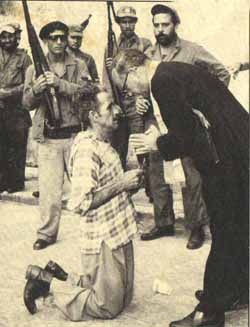
"You erected pillars in the house of peace;" above, a Cuban political prisoner before being shot by a firing squad |
On January 8, 2005, while receiving the credentials of the new Cuban ambassador, John Paul II praised the “goals” that the “Cuban authorities” supposedly accomplished in the fields of health, education and culture. Actually, for more than a half-century this trilogy has been touted by the regime to corrupt the consciences of whole generations of Cubans since childhood, causing a spiritual genocide without precedent in the history of the Church in the three Americas.
Notwithstanding, on that same occasion John Paul II praised the regime, stressing that through that trilogy the “authorities” of Cuba - that is, the members of the Castro regime - “erected pillars in the house of peace” and promoted “harmonic growth of the body and the spirit.” He seemed to ignore that Fidel Castro and Che Guevara, in the name of that same trilogy, caused the destruction and death of “body and spirit” of countless persons in many countries of Latin America, Africa and Asia.
His praise for members of the Castro dictatorship could not have been higher. For the Cubans who suffered - and continue to suffer - the damage of the communist revolution in their country, these papal words are particularly painful, and I sincerely cannot find any justification for them. Those words go far beyond courteous diplomatic formulas. They shock and shatter the memory of those young Cuban Catholic martyrs who were shot by firing squads and died shouting: “Viva Cristo Rey! Abajo el Comunismo!” [Long live Christ the King! Down with Communism!]
Praising Cuba for exporting the Communist revolution
In that same speech, one of the most important about Cuba in his long pontificate, John Paul II extended his recognition to an alleged “spirit of solidarity” of Cuban internationalism supposedly manifested by “the shipment of personnel and resources of basic necessities” to other nations when they suffered “natural calamities, conflicts or poverty.”
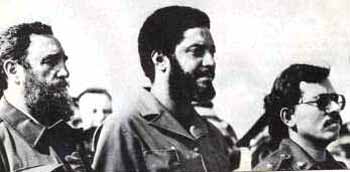
Exporting revolution to Grenada and Nicaragua |
In reality, far from reflecting Christian solidarity, the mentioned internationalism assigned Cuba the sad role of exporting conflicts to Latin America, Africa and Asia. It has used “personnel and resources” not to end strife or diminish poverty, but to exacerbate them by rearing guerillas, thus provoking bloody calamities much worse than any natural disaster. As history demonstrates, Cuban internationalism has helped to drag nations into the worst possible material and spiritual poverty, rather than to draw them out of this sad condition.
Praising Che Guevara
One of the principal Cuban models of international “solidarity” is the Argentine-Cuban guerilla Ernesto Che Guevara, who went so far as to praise hatred as a motor that can transform the revolutionary into “an effective, violent and selective killing machine.”
In face of this reality, the Pope’s reference to the supposed “spirit of solidarity” marking Cuban internationalism only causes consternation. (cf. A. Valladares, "John Paul II, Cuba and a Problem of Conscience," Diario las Americas, January 15, 2005).
H.H. John Paul II did not mention Che Guevara in that allocution. But he did speak of him in January 1998, when he made some brief eulogies of him during his flight to Cuba.
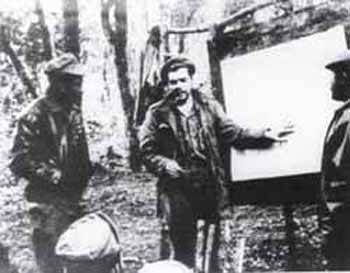
Guevara teaching guerillas in Congo - "serving the poor"... |
In an informal conversation with journalists who asked him about Che Guevara, the Pontiff answered: “He is now before God’s Tribunal. Let us leave Our Lord to judge his merits. I am certain that he wanted to serve the poor.” (Vatican Information Service, “Journalists interview the Pope during his flight to Cuba, January 21, 1998)
The source of this reply - the news agency of the Holy See itself - could not be more official, which makes these words especially daunting. How could a bad tree produce good fruits, such as Christian service to the poor and abandoned? Was not Che Guevara a “satanic scourge” – the expression used by Pius XI to describe Communism - of Cuba and so many other countries? Did he not promote bloody revolutions that principally harmed the poor, the ones whom the Pontiff claimed Guevara wanted to serve? (cf. A. Valladares, Msgr. Cespedes, "John Paul II & Che Guevara," Diario las Americas, June 26, 2008)
Abandoning the anti-Communists in exile
By a lamentable coincidence, these eulogies of Che Guevara were made by John Paul II precisely when his plane to Havana was passing over Florida, where the greatest number of Cuban refugees lives in exile. Those eulogies were spiritually harmful to those refugees who had been obliged to abandon their country to escape Communist persecution.
The incident was a vivid reminder of when John Paul II visited Miami 11 years earlier in 1987 and did not visit the symbolic Shrine of the Virgin of Charity of Cobre, patroness of Cuba. He did not grant a requested audience to a delegation representing the refugees, nor did he offer a single word of consolation to all the Cubans in exile. He also appeared to not notice the thousands of Cuban banners waved by multitudes of refugees during the public ceremonies of his visit.
The severe lightning and thunderstorm that interrupted the public papal Mass when John Paul II was in Miami symbolized well the sense of abandonment felt by those thousands of refugees.
Promoting a Catholic-Communist synthesis in Cuba
After the warm reception given to the dictator Castro in Rome in 1996 as well as John Paul II’s trip to Cuba in 1998, there were many reports about the publicity and diplomatic benefits they produced for the Communist regime of Havana. Here I select only a few less publicized comments by John Paul II during his papal visit to Castro. The data are taken from the document “Communist Cuba after the Papal Visit,” published in 1998 by The Cuban Liberty Council located in Miami.
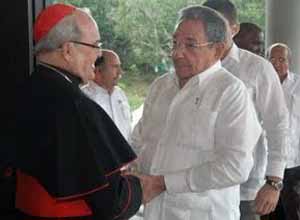
A Catholic-Communist synthesis: above, Card. Ortega greeting Raul Castro |
In one of his speeches in Havana, after proposing a “fruitful dialogue” between believers and non-believers – that is, Cuban Communists, the Pope encouraged the two parties to seek a cultural “synthesis” under the presupposition that both shared the common goal of “serving man.” (Speech at the University of Havana, Jan. 23, 1998)
With all due respect, I cannot understand how a synthesis can be made between two completely opposed and incompatible cultures such as the one born from the Catholic Faith and the other a Marxist anti-culture. How is it possible to form a “synthesis” between good and evil, light and darkness, Jesus Christ on one side and Karl Marx, Che Guevara and Fidel Castro on the other?
It is also impossible to understand John Paul II’s affirmation that the Church and the cultural institutions of the Cuban Communist system could share the “common goal” of fostering the spiritual progress of Cubans. For 40 years, the “goal’ of the regime has been to methodically destroy the “Christian soul,” utilizing all its resources for this end. This goal has nothing in common with the Catholic goal, but is diametrically opposed to it.
Favoring Communism by actions and omissions
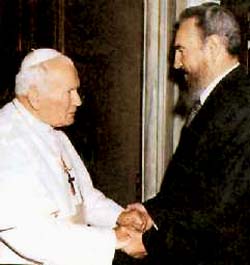
John Paul II supporting Castro in 1998 |
Another aspect of John Paul II’s pontificate that caused perplexity and disappointment among countless Cubans was the series of pardons he asked for supposed past and present sins of the Church’s children. Among these, however, not the least reference was made to the ideological connivance and strategic complicity of so many ecclesiastics with Communism in Cuba - as well as in other countries - by either action or omission. (Cf. "The Request for Pardon that Did Not Take Place: Church Collaboration with Communism," Diario las Americas, March 22, 2000)
Throughout his long pontificate, John Paul II supported the collaborationist Cuban Bishops, especially at the National Meeting of the Cuban Church in February 1986. In the message transmitted by Cardinal Eduardo Pironio, John Paul II expressed his “merited recognition” of the final Document that proposed the bold and astonishing aim of forging a “vital synthesis” between Catholics and Communists. He also raised to a Cardinal the Archbishop of Havana [Jaime Lucas Ortega], one of the principal architects of the Catholic-Communist merge.
Among the examples showing how John Paul II directly or indirectly favored Cuban Communism by his actions and omissions, I mention three filial messages of Cubans in exile sent to him that unfortunately remained unanswered. These letters bore the signatures of many public figures representing exiled Cubans:
- A 1987 letter titled “Holy Father, Free Cuba” addressed to John Paul II during his visit to Miami (Diario las Americas, August 7, 1987);
- A 1995 letter to the Pope in Rome titled “Cubans in Exile Appeal to John Paul II: Holy Father, Protect Us from the Actions of Cardinal Ortega! (Diario las Americas, October 24, 1998);
- And another letter in 1999 titled “Holy Father, Save from Oblivion the Cuban Martyrs, Victims of Communism!” (Diario las Americas, September, 1999).
I heard that during the process of beatification of John Paul II, many Catholics publicly expressed perplexity over his words, actions and omissions in the religious sphere. But I have not heard such comments regarding his position on Cuban Communism, not only on the diplomatic level, but also the doctrinal. For this reason I feel compelled by conscience to filially and respectfully make these reflections.
In all sincerity, I cannot see how Cuban Catholics inside or outside the Island who follow the general thesis presented here and by other fellow compatriots could consider John Paul II a model to be imitated and followed, given his conduct regarding Communism in our country.

Posted April 15, 2011
Armando Valladares, a former Cuban political prisoner,
was U.S. Ambassador to the U.N. Commission on Human Rights in Geneva
during the Reagan and Bush administrations.
Contact the author at:
Armandovalladares2005@yahoo.es

Related Topics of Interest
 John Paul II, Cuba and a Problem of Conscience John Paul II, Cuba and a Problem of Conscience
 Benedict XVI and Bertone’s Trip to Cuba Benedict XVI and Bertone’s Trip to Cuba
 The Ambassador Lie and the Martyr's Blood The Ambassador Lie and the Martyr's Blood
 The Cuban Fiasco The Cuban Fiasco
 JPII Says Mass in Havana's Revolution Square JPII Says Mass in Havana's Revolution Square
 Declaration of Resistance to the Vatican Ostpolitik Declaration of Resistance to the Vatican Ostpolitik
 Card. Bertone and Castro's Fraudulent “Religious Policy” Card. Bertone and Castro's Fraudulent “Religious Policy”
 Beatification of Castro's Internationalism? Beatification of Castro's Internationalism?
 The Perplexing Pontificate of John Paul II The Perplexing Pontificate of John Paul II

Related Works of Interest
|
|
Traditionalism | Hot Topics | Home | Books | CDs | Search | Contact Us | Donate

© 2002- Tradition in Action, Inc. All Rights
Reserved
|
 |
|